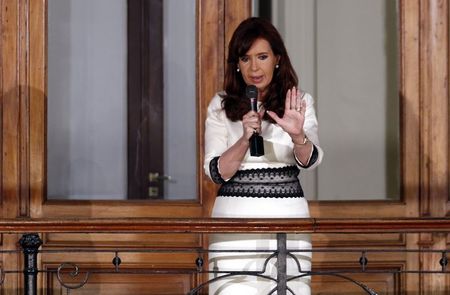By Sarah Marsh and Walter Bianchi BUENOS AIRES (Reuters) - President Cristina Fernandez on Tuesday unveiled legislation that seeks to push bondholders to swap defaulted debt for new notes governed by Argentine law, a move aimed at skirting a U.S. ruling that prevented her government from paying its creditors.
Argentina slid into default last month after a New York court blocked an interest payment of $539 million (324.62 million British pound) owed to holders of debt issued under U.S. legislation that was restructured after the country's record 2002 default.
The judge said Argentina could not proceed with that payment until it had also settled on repayment terms with a group of hedge funds that had rejected the restructuring deal and are demanding full payment.
Fernandez has argued Argentina is not in default and has consistently labeled the adverse U.S. court rulings an attack on Argentine sovereignty. The draft bill appeared to be an attempt to bring Argentina's debt management back under its full control.
"If bondholders decide - in individual or collective form - to ask for a change of the legislation and jurisdiction of their bonds ... the economy ministry is authorized to implement a swap for new public bonds under local legislation, Fernandez said in a televised statement.
A new bond swap carries legal risks, analysts said, and appeared to kill hopes that Argentina might soon reach a deal with the hedge-fund holdouts, enabling it to exit default.
A prolonged debt crisis is seen deepening the country's economic recession, weakening the ailing currency and sapping thin foreign currency reserves.
Fernandez, who has been unflinching in her refusal to pay the holdouts the full face value on their bonds, said a new restructuring would respect the terms of earlier bond swaps in 2005 and 2010. More than 90 percent of creditors accepted large writedowns at the time.
The usually tough-talking leader appeared on the verge of tears as she neared the end of her address.
"Excuse me if I get a little nervous, I usually have more poise. However, I really feel that we are living a moment of great injustice in Argentina," Fernandez told the nation of 40 million people.
CONTEMPT
Fernandez said the holdouts - or "vultures" as she described them - could participate in the new restructuring if they accepted the same terms as other bondholders - a proposal the New York hedge funds have repeatedly scoffed at.
The draft bill also proposes removing Bank of New York Mellon - where the frozen June 30 coupon payment is held in limbo - as the exchange bondholders' trustee. It plans replacing it with the state-run Banco Nacion, which would open up an account at the central bank to enable Argentina to service its exchange debt there.
The sovereign debt bill will likely enjoy smooth passage through Congress because Fernandez's faction of the ruling Peronist movement enjoys a strong majority in both chambers.
The debt saga has strained already difficult relations with the United States.
A series of rulings by U.S. District Judge Thomas Griesa set off a wave of heated exchanges with Argentine officials. They said Griesa did not understand the complexities of the case and instead blamed Griesa for overstepping his bounds and blocking the payment.
It was not clear on Tuesday night whether the maneuver could succeed in sidestepping the U.S. court's rulings and what impact it might have on the country's default status.
"Argentina could end up in contempt," said Alejo Costa, strategy chief at local investment bank Puente in Buenos Aires.
The proposed bond swap reduced the likelihood of Argentina reaching an agreement with the holdouts and dashes hopes of Argentina returning to global capital markets any time soon, said Costa.

Lead holdout hedge funds NML Capital Limited and Aurelius Capital Management did not immediately respond when contacted by Reuters.
(Writing by Richard Lough; Editing by Kieran Murray, Ken Wills and Eric Meijer)
